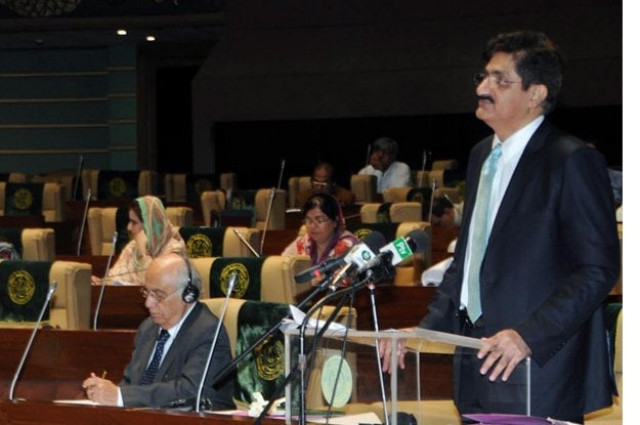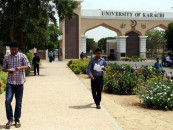Sindh unveils Rs1.4tr tax-free budget
Increases development portfolio by 41%; govt employees’ salaries by 20%

The PPP-led Sindh government on Tuesday unveiled a Rs1,477 billion tax-free deficit budget for the next financial year 2021-22 amidst a noisy protest by the opposition lawmakers.
Sindh Chief Minister Murad Ali Shah who also holds the portfolio of finance minister presented the budget, announcing a 20% increase in salaries of government employees while setting the minimum wage in the province to Rs25,000. He also announced 3,000 jobs in various departments.
In the budget, the provincial government increased the development portfolio by 41%, allocating Rs329 billion for it. The opposition members – belonging to the PTI, the MQM and the GDA protested against the budget in the house and tore the agenda copies, calling the budget “anti-people”.
According to the budget books, the total receipts of the province in the next fiscal year – 2021-2022 – are estimated at Rs1.452 trillion as against budget estimates of Rs1.2 trillion for the current year, showing an overall increase of 19%. However, there would be a deficit of Rs25.738 billion.
However, the Sindh government has estimated Rs869.68 billion receipts from the federal government on account of revenue assignment and straight transfers and grants. This amount constitutes 72% of the total receipts of the province.
#Sindh Cabinet has approved an increase of 20% in the salary of Govt employees & also set the minimum wage at 25,000 in the province. No new tax is being introduced by #SindhGovt #SindhBudget
— Murtaza Wahab Siddiqui (@murtazawahab1) June 15, 2021
These receipts have increased by 12.6% when compared to current year estimates of Rs760.3 billion.
According to the CM, the budget estimates of straight transfers for the next financial year have substantially decreased by approximately 20.6% to Rs49 billion from the current fiscal year estimates of Rs62 billion.
The budget documents revealed that the receipts of the federal Public Sector Development Programme (PSDP) are estimated at Rs5.37 billion and receipts on account of foreign project assistance, budgetary support loans and grants are estimated at Rs71 billion.
The receipts from the province’s own sources on account of tax and non-tax receipts are estimated at Rs329 billion which according to books constitutes 27.5% of the total receipts. “There is an increase of 4.8% on account of tax and non-tax receipts. The receipts were Rs313b in the current fiscal year,” he said.
In the budget, the provincial government has earmarked Rs329 billion development outlay that includes Rs222.5b for the provincial development plan, Rs71b for foreign funded projects, Rs30b for districts and an estimated Rs5.37b in federal grants.
In this budget, the development outlay has increased by 41% as the current year’s development outlay was Rs232 billion with Rs155b for the provincial Annual Development Programme (ADP), Rs54b for foreign funded projects, Rs15b for districts and Rs8.3b in federal grants.
However, the development targets as planned in the budget could not be achieved because of different factors, including delays in release of funds by the federal and provincial finance departments and the diversion of funds for Covid-19 related programmes.
With this, the revised estimates for the development portfolio of the current fiscal year stood at Rs160b. According to the budget books, a total of 3,315 schemes have been included in the provincial ADP at an estimated cost of Rs222.5 billion in which 1,670 are news schemes worth Rs84.11b.
In the next year's budget, health remains a priority sector. The total non-development budget estimates for the sector – excluding medical education – has been enhanced by 29% from Rs132b to Rs172b. In the development side, the ADP of health is pitched at Rs18b.
For the education sector, a total of Rs272b has been allocated for the next fiscal year as compared to Rs243b in the current fiscal year. This shows a 14% increase. However, in the education sector, Rs26b have separately been kept for development schemes.
These funds include Rs14b for school education, Rs4b for college education, Rs800m for the empowerment of persons with disabilities, Rs1200 million for Sindh Technical Education and Vocational Authority (Stetva) and Rs6b for universities and boards.
Besides funds in the provincial ADP, the government has earmarked Rs4.28b for foreign project assistance for the education sector. For the next year, the government has proposed a total allocation of Rs82b for local bodies.
The government has also announced plans to run Diesel Hybrid Electric Buses in the province. In this regard, the current allocation for the Transport & Mass Transit department in the NFY 2021-22 has been enhanced by 1315% to Rs.7.64 billion, as 250 Diesel Hybrid Electric Buses will be purchased.
Apart from this, a pro-poor social protection and economic sustainability package of Rs30.90 billion has been kept in the current budget to support the deserving persons and revival of the economy.
Besides, Rs3 billion have been allocated for the revival of the agriculture sector; Rs16 billion for social welfare of the citizens; Rs1.70 billion have been allocated for revamping the IT sector and Rs3 billion for Industrial development through small medium enterprises (SMEs).
Rs2.00 billion have been earmarked for low cost housing and Rs1 billion for livestock & fisheries support. Rs500 million have been kept for women agriculture workers and Rs500 million for special children fund.
Promises on paper
"The budget is jugglery of words. This is the 13th consecutive year of the Pakistan Peoples Party's rule in Sindh, but they have not utilised 50 per cent of development budget in any year," said Leader of the Opposition in Sindh Assembly Haleem Adil Shaikh, alleging that the funds directly go into the pockets of the PPP leadership.
"Not a single scheme is being launched in opposition members' constituencies. The PPP-led Sindh government has set a precedent of discriminating against political opponents. Karachi is the capital of Sindh, where the people have given the mandate to either the Pakistan Tehreek-e-Insaf or the Muttahida Qaumi Movement-Pakistan. This is why Sindh government is punishing citizens by not launching mega schemes for the city," alleged Haleem.
However, Sindh Information Minister Syed Nasir Hussain Shah rejected the opposition's claims and said that the Sindh government has given more to Karachi and others. He said that the Malir Expressway, roads projects, treatment plans and other schemes have been kept for Karachi in upcoming budget.
"People want to know about Prime minister Imran Khan's Rs1100b package for Karachi. Where did it go? Why did not they release the funds," asked Shah, adding that PTI leaders should demand of the PTI-led federal government in the Centre to release funds for the development of Sindh and live up to their pledge rather than criticising the provincial government.



















COMMENTS
Comments are moderated and generally will be posted if they are on-topic and not abusive.
For more information, please see our Comments FAQ